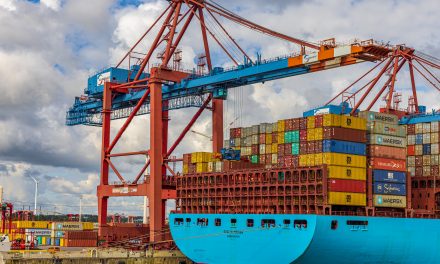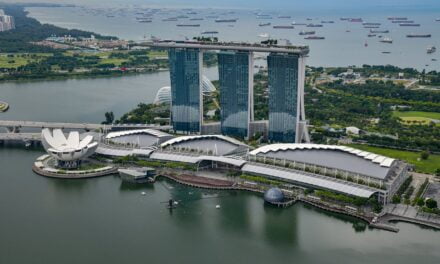The Singapore economy grew at its quickest pace in 18 months in the first quarter, official data showed Thursday, while the city-state’s growth forecast for 2024 was maintained.
Singapore’s gross domestic product expanded 2.7% year-on-year in the first quarter of 2024, up from 2.2% growth in the previous quarter.
On a quarter-on-quarter seasonally-adjusted basis, the economy expanded by 0.1%, moderating from the 1.2% growth in the quarter before.
Standout sectors
Growth was helped by a stellar performance in the Accommodation sector, which expanded by 14% from the year before, up from 1.5% growth in the quarter prior.
“Growth of the sector continued to be bolstered by a strong recovery in international visitor arrivals, due in part to the mutual visa-free arrangement with China, as well as the robust lineup of international live entertainment, business and sporting events during the quarter,” Singapore’s Ministry of Trade & Industry said on Thursday.
American pop star Taylor Swift’s slew of concerts in March, with Singapore being the only country in the region she visited, was a standout event that helped boost the sector.
Other sectors which helped the economy included the Finance & Insurance, Transportation & Storage and Wholesale Trade sectors, the ministry noted.
The Finance & Insurance sector expanded by 6.5% year-on-year, improving from the 5.4% growth in the quarter prior.
Growth in the Transportation & Storage sector rose to 6.8% from 2.8% growth in the fourth quarter of 2023.
The Wholesale Trade sector grew by 1.5% year-on-year, up from the 0.2% growth in the quarter before.
Meanwhile, the Manufacturing sector shrunk by 1.8% year-on-year in the first quarter, swinging from growth of 1.4% in the last quarter of 2023.
“The weak performance of the sector was mainly due to output declines in the biomedical
manufacturing, electronics and general manufacturing clusters,” the ministry said.
Outlook maintained
Singapore’s GDP growth forecast for this year was maintained at between 1.0% and 3.0%.
Singapore’s manufacturing and trade-related sectors are expected to see a gradual pickup in growth over the course of the year,” the ministry said.
“Within the manufacturing sector, the electronics cluster is projected to recover gradually in the coming quarters, supported by demand for semiconductors for end-markets such as smartphones, PCs and AI.
“Growth in the electronics cluster will in turn have positive spillover effects on the precision engineering cluster, as well as the machinery, equipment & supplies segment of the wholesale trade sector.”
Additionally, aviation and tourism-related sectors are expected to be buoyed by the continued recovery in air travel and tourism demand.
“At the same time, the finance & insurance sector will be supported by higher tourist spending which will benefit the payments segment, as well as the projected peaking of global policy interest rates which will support the banking and fund management segments through higher commissions and fees,” the ministry said.
Economic policy
The Monetary Authority of Singapore believes that the current monetary policy set in place is appropriate following the release of the recent data.
“The prevailing rate of appreciation of the exchange policy band is needed to keep a restraining effect on imported inflation as well as domestic cost pressures,” said Edward Robinson, the deputy managing director of the economic policy group at MAS, in a media briefing on Thursday.
“We had assessed it to be sufficient to ensure medium-term price stability in the economy.”
Challenges ahead amidst new leadership
Lawrence Wong was inaugurated as Singapore’s prime minister last Wednesday, marking the first change in leadership in two decades.
Wong faces challenges from multiple fronts, including significant economic pressures.
In his inaugural speech, he said: “The great powers are competing to shape a new, yet undefined, global order. This transition will be marked by geopolitical tensions, as well as protectionism and rampant nationalism everywhere. It will likely stretch for years if not decades.
“As a small country, we cannot escape these powerful cross-currents. As an open economy, our livelihoods will be hit when multilateralism fractures. As a diverse society, we will be vulnerable to external influences that tug us in different directions.”
Singapore’s Ministry of Trade & Industry echoed this on Thursday, highlighting that downside risks to the global economy remained – threatening not least the city, posing significant threats to Singapore, one of Asia’s leading financial hubs and trading crossroads.
“First, escalations in geopolitical tensions in the Middle East or the war in Ukraine could disrupt global supply chains and commodity markets. This would weigh on global trade and growth,” the ministry said.
“Second, disruptions to the global disinflation process could lead to tighter financial conditions for longer, and potentially trigger latent vulnerabilities in banking and financial systems.
“Third, vulnerabilities in emerging markets arising from a desynchronization of their monetary policy cycles with that of advanced economies could lead to greater volatility in capital flows and currency fluctuations.”
To combat the myriad of challenges, Prime Minister Wong said last week: “We will strengthen our partnerships, near and far; and advance Singapore’s interests, so as to better shape outcomes for ourselves as well as the world.”







